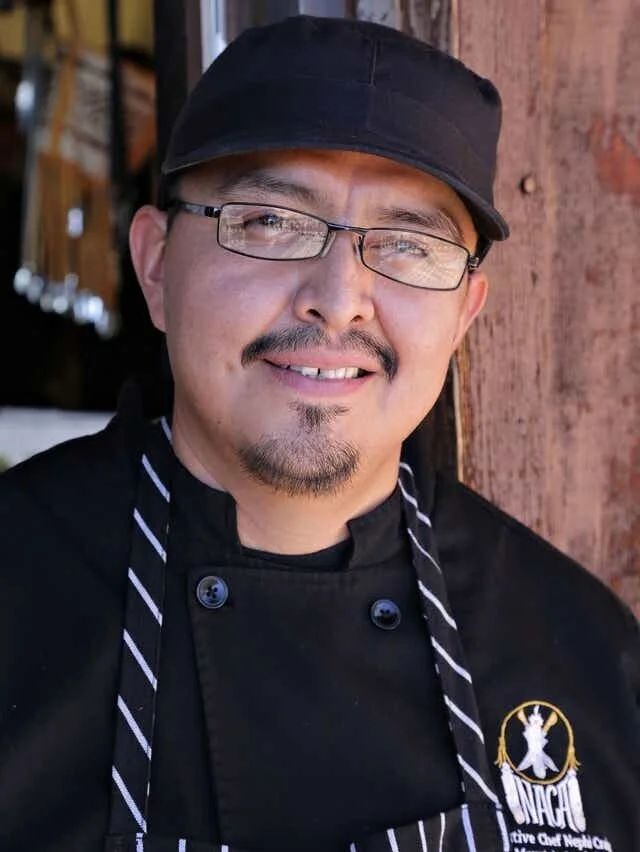Hunt. Fish. Gather.
Logo by Tina Sparks, Pueblo and Hunka Lakota descent
Nakikara. Hohigisik. Stohi.
Hunt. Fish. Gather.
Monday, November 18, 2019
6:00 pm
The Living World, St. Louis Zoo
Squash Bee Level Sponsors ($3,000 contribution): Buder Center, Sandra and Virgil Van Trease, Missouri Humanities Council, Saint Louis Zoo
Bear Level Sponsor ($500 contribution): Explore Green, Mary Brong and Ed Spevak
About Hunt. Fish. Gather.
The Hunt. Fish. Gather. program was created by Buder Center students and the Buder Center in collaboration with Washington University Dining Services in 2013. Historically, the project has provided education to the Washington University and local native community on a more holistic model of health and wellness, with a focus on traditional Native foods, unlike what is currently represented in much of Westernized society.
Native people have an intimate relationship with the natural world as evidenced by their culturally traditions and language. Over the years, the language of the Hunt. Fish. Gather. program has been translated to the many different Native languages of Buder Center students. The language for the 2019 Hunt. Fish. Gather Program has been translated into the Ho-Chunk language.
This year, the Hunt. Fish. Gather. program has evolved in scope and purpose: the event serves as the formal beginning of the Alliance for Native Programs and Initiatives (ANPI).
This Year’s Chef
Photo by Mark Woodard
Freddie Bitsoie is a Diné (Navajo), Native American Chef, and the owner of FJBits Concepts, a firm that specializes in Native American food ways. He is the Executive Chef of The Mitsitam Native Foods Café (Mitsitam means “Let’s Eat” in the Delaware language), the restaurant of The Smithsonian Museum of the American Indian in Washington, D.C. Freddie has traveled the country, making presentations for organizations and companies such as Kraft Foods, The College of Holy Cross, Yale University, and the Heard Museum in Phoenix, AZ. He has been featured in and also contributes to Indian Country Today.
As an indigenous chef, Freddie sees the revival of native cuisine from its core elements—the ingredients. “For hundreds of years, ingredients hardly ever changed, yet cultures and trends changed all time. Why try to explain food from ever changing ideals? Let’s observe food from the ever non changing ingredient. That point of view is far more delicious and realistic.”
Freddie attended the University of New Mexico, majoring in cultural anthropology with a minor in art history before attending culinary school. Today, he is one of the most sought after and renowned Native American chefs and native foods educators in the country. He has been featured in the New York Times, National Public Radio, Cowboys and Indians, and America, The Cook Book.
Past Hunt. Fish. Gather. Chefs
Hillel Echo-Hawk (Pawnee and Athabaskan) was born and raised in the interior of Alaska. Echo-Hawk is dedicated to the food sovereignty of Native Peoples and is committed to empowering all Indigenous Peoples by increasing knowledge of an access to traditional diets and foods. After receiving her Bachelor's degree in Culinary Arts from Seattle Central College, Echo-Hawk has been working as a chef in some of Seattle's most innovated and popular restaurants for several years. She has also worked as a private chef, catering various events from the local Native non-profits and Native community events with pre-colonial, Indigenous meals. Hillel is a sister, aunt, daughter, and active member of her community.
Nephi Craig (White Mountain Apache and Navajo) works as a Nutritional Recovery Program Coordinator and Executive Chef at the Rainbow Treatment Center in Arizona. He has extensive experience as a chef, traveling nationally and internationally to the UK, Germany and Japan. He is the founder of the Native American Culinary Association, an organization dedicated to the research, refinement, and development of Native American cuisine. Nephi has also published pieces about the current state and evolution of Native American culinary traditions affected by hunting, fishing and agricultural rights, as well as United States and Indian relations in Native history. In his current position, Nephi connects Native cuisine knowledge to the process of recovery for his clients, focusing on culture and food as a way to heal.




